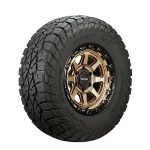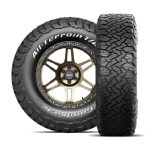When it comes to vehicle maintenance, one of the most crucial aspects is ensuring your tires are in top condition. Tires are the only part of your car that makes contact with the road, making their performance vital for your safety. This article delves into how often you should change tires on your car, helping you make informed decisions to ensure your safety and enhance your vehicle’s performance.
Understanding Tire Lifespan
Factors Influencing Tire Life
How often change tires on car? The lifespan of your tires can vary significantly based on several factors. These include:
- Tread Wear: The depth of the tire tread affects traction and handling. Once the tread wears down to 2/32 of an inch, it’s time for a change.
- Driving Conditions: Frequent driving on rough roads or in extreme weather can lead to faster tire wear.
- Tire Type: Different tires are designed for varying conditions. All-season tires may not last as long as winter tires if used outside their intended conditions.
- Maintenance: Regular rotations, alignments, and proper inflation can extend tire life.
Average Tire Lifespan
On average, tires can last between 25,000 to 50,000 miles. However, it’s essential to monitor their condition regularly. Check your tire’s tread depth with the penny test: insert a penny into the tread with Lincoln’s head facing down. If you see all of Lincoln’s head, it’s time to replace your tires.
Signs It’s Time to Replace Your Tires
Visual Indicators
Look for these signs that indicate your tires may need changing:

- Tread Wear Indicators: Many tires have built-in indicators that show when it’s time for a replacement.
- Cracks or Bulges: Visible cracks or bulges can indicate internal damage, necessitating a tire change.
- Uneven Wear: If you notice uneven tread wear, it might be due to misalignment or improper inflation.
Performance Issues
How often change tires on car? If you experience any of the following performance issues, consider changing your tires:
- Reduced Traction: If your car struggles for grip during wet or slippery conditions, your tires may be worn.
- Vibration: Excessive vibration while driving can indicate problems with the tires or alignment issues.
Seasonal Changes and Tire Swaps
Why Seasonal Tires Matter
Using the appropriate tires for the season can significantly affect performance and safety. Winter tires, for example, are designed to provide better traction in snowy or icy conditions, while summer tires perform best in warm weather.
Recommended Tire Change Frequency
- Winter Tires: Typically, winter tires should be installed when temperatures drop consistently below 45°F and removed when temperatures rise consistently above that mark.
- All-Season Tires: These can generally remain on the car year-round but should be replaced every 6 years, regardless of mileage.
How to Extend the Life of Your Tires
Regular Maintenance
Taking care of your tires can prolong their lifespan. Here are some key maintenance tips:
- Tire Rotation: Rotate your tires every 5,000 to 7,500 miles to ensure even wear.
- Alignment Checks: Have your alignment checked at least once a year or when you notice uneven wear.
- Proper Inflation: Check tire pressure monthly. Under-inflated tires wear out faster and can lead to blowouts.
Driving Habits
Your driving habits can also influence tire longevity. To help extend the life of your tires:
- Avoid Rapid Acceleration and Braking: Smooth driving helps reduce stress on tires.
- Don’t Overload Your Vehicle: Excess weight can lead to faster wear.
- Mind the Roads: Try to avoid potholes and other road hazards.
Cost of Tire Replacement
Understanding Costs
The cost of replacing tires can vary based on several factors, including tire type, brand, and vehicle type. On average, expect to pay between $100 to $300 per tire.
Budgeting for Tire Replacement
To avoid surprise expenses, budget for tire replacement as part of your vehicle maintenance plan. Consider setting aside a small amount each month specifically for tire care and replacement.
FAQs About Tire Replacement
How can I tell if my tires are bald?
Bald tires show minimal tread and can be identified by using the penny test. If you can see the top of Lincoln’s head when inserting a penny, it’s time for new tires.

Can I mix different types of tires on my car?
It’s not recommended to mix different tire types, as this can affect handling and performance. Stick with matching tires for the best results.
What happens if I don’t change my tires?
Neglecting to replace worn tires can lead to decreased traction, increased stopping distances, and a higher risk of blowouts.
The Importance of Tire Quality
Investing in Quality Tires
Choosing high-quality tires can make a significant difference in performance and safety. Premium tires often offer better traction, longevity, and fuel efficiency. While they may cost more upfront, they can save you money in the long run by reducing wear and enhancing your vehicle’s handling.
Recognizing Trusted Brands
When purchasing new tires, consider reputable brands known for their quality and reliability. Look for brands with positive reviews and a strong track record in safety and performance. Always check for tire certifications to ensure they meet safety standards.
Eco-Friendly Tire Options
Sustainability in Tire Choices
With growing environmental concerns, many manufacturers now offer eco-friendly tire options. These tires often feature lower rolling resistance, which can improve fuel efficiency and reduce carbon emissions.
Benefits of Green Tires
- Improved Fuel Efficiency: Eco-friendly tires help your vehicle use less fuel, saving you money at the pump.
- Reduced Environmental Impact: Many sustainable tires are made from recycled materials and are designed to be less harmful to the environment.
Tire Storage Tips
How to Store Tires Properly
If you switch between seasonal tires, proper storage is essential for maintaining their condition. Here are some tips:
- Clean the Tires: Before storing, clean your tires to remove dirt and debris, which can cause damage over time.
- Store in a Cool, Dry Place: Avoid exposing tires to direct sunlight or extreme temperatures, which can degrade rubber.
- Avoid Stacking: If you’re storing tires with rims, store them upright. If without rims, stack them flat to avoid warping.
Preparing for Seasonal Changes
As seasons change, prepare your tires accordingly. Have them inspected for wear before installation and make sure they are properly inflated for the best performance.
Advanced Tire Technology
Innovations in Tire Design
The tire industry continually evolves, with new technologies aimed at enhancing performance and safety. Some innovations to look out for include:
- Run-Flat Tires: These tires are designed to be driven on even when punctured, allowing you to reach safety without needing immediate assistance.
- Smart Tires: Integrated sensors can monitor tire pressure and tread wear, providing real-time data to drivers via smartphone apps.
Benefits of Technology-Driven Tires
Investing in technologically advanced tires can improve safety and convenience. For instance, smart tires can alert you to pressure changes, potentially preventing accidents due to tire blowouts.
Safety Tips When Driving on Worn Tires
Recognizing Dangers
Driving on worn tires can be risky. It’s essential to know how to mitigate dangers when you’re unable to replace your tires immediately:

- Increase Following Distance: Allow more space between you and the vehicle ahead to react better in emergencies.
- Drive at Moderate Speeds: Reduce speed to improve control and stopping distance.
- Avoid Sudden Maneuvers: Steer gently and avoid abrupt stops or turns to maintain grip.
When to Seek Help
If you notice any significant issues with your tires, don’t hesitate to consult a professional. Whether it’s a flat tire, unusual wear patterns, or alignment problems, addressing these issues promptly can prevent accidents and save money.
Keeping Your Tires in Check
Knowing how often to change tires on your car is vital for safety and performance. Regular maintenance, monitoring for signs of wear, and choosing the right tires for the season can significantly extend their lifespan. Remember, investing in your tires is investing in your safety.


